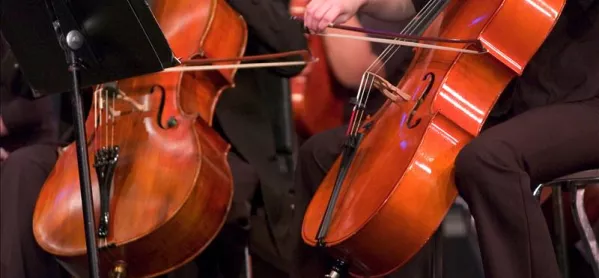Don’t string us along on music funds
Cellist warns against cuts in investment after the general election
Share
Don’t string us along on music funds
https://www.tes.com/magazine/archive/dont-string-us-along-music-funds

World-famous cellist Julian Lloyd Webber has called on any future government not to slash budgets for music in schools after the general election.
The Department for Children, Schools and Families restated its pledge this week to invest pound;330 million in music opportunities for children until 2011 and Mr Lloyd Webber has urged both Labour and the Conservatives to make a similar commitment for post-election spending.
Speaking to The TES ahead of yesterday’s launch of the National Year of Music, a year-long initiative promoting the benefits of music, Mr Lloyd Webber said music can have a “huge effect” in transforming the lives of young people, particularly those from deprived backgrounds. “The Government has been doing a great deal for music education in this country over the past few years, but I don’t think that message has been seeping through,” he said.
“You still hear the same old arguments that it is cutting back and there aren’t the facilities, but they have invested pound;330 million.”
Throughout the Year of Music, Mr Lloyd Webber will be working on his In Harmony programme, which brings music to children from deprived backgrounds in Liverpool, Lambeth, south London, and Norwich. “In July, the children in the Liverpool project gave a performance at the Philharmonic Hall and the effect it had on the families was hugely positive,” he said.
“Through projects like In Harmony, the money saved by reducing crime could far outweigh the initial outlay. It is well known that learning an instrument can give you valuable skills in discipline and concentration.”
The programme aims to give every child “the chance to get more from music” by giving them access to “quality music and musical opportunities” and is expected to run throughout the academic year.
Ed Balls, the Schools Secretary, wrote a letter to every headteacher in the country to help kick-start the campaign: “Learning to play an instrument, singing in a choir, or taking part in a musical performance can inspire creativity, improve concentration skills, encourage motivation and determination, and build social and life skills.”
A recent study by the Institute of Education (IoE) flagged up the impact of music on the intellectual, social and personal development of children.
Professor Susan Hallam of the IoE said: “Speech and music have a number of shared processing systems. Musical experiences which enhance processing can, therefore, impact on the perception of language, which in turn impacts on learning to read. Active engagement with music sharpens the brain’s early encoding of linguistic sound. Eight-year-old children with just eight weeks of musical training showed improvement in perceptual cognition compared with controls.”
The programme was launched with the “world’s ultimate music lesson”, a live online session beamed around the UK featuring three minutes of instruction by DJ Yoda, Killa Kela and N-Dubz.
You've reached your limit of free articles this month. Subscribe for £1 per month for three months and get: